Charles E W Bean, Diaries, AWM38 3DRL 606/249/1 - 1917 - 1932 - Part 11
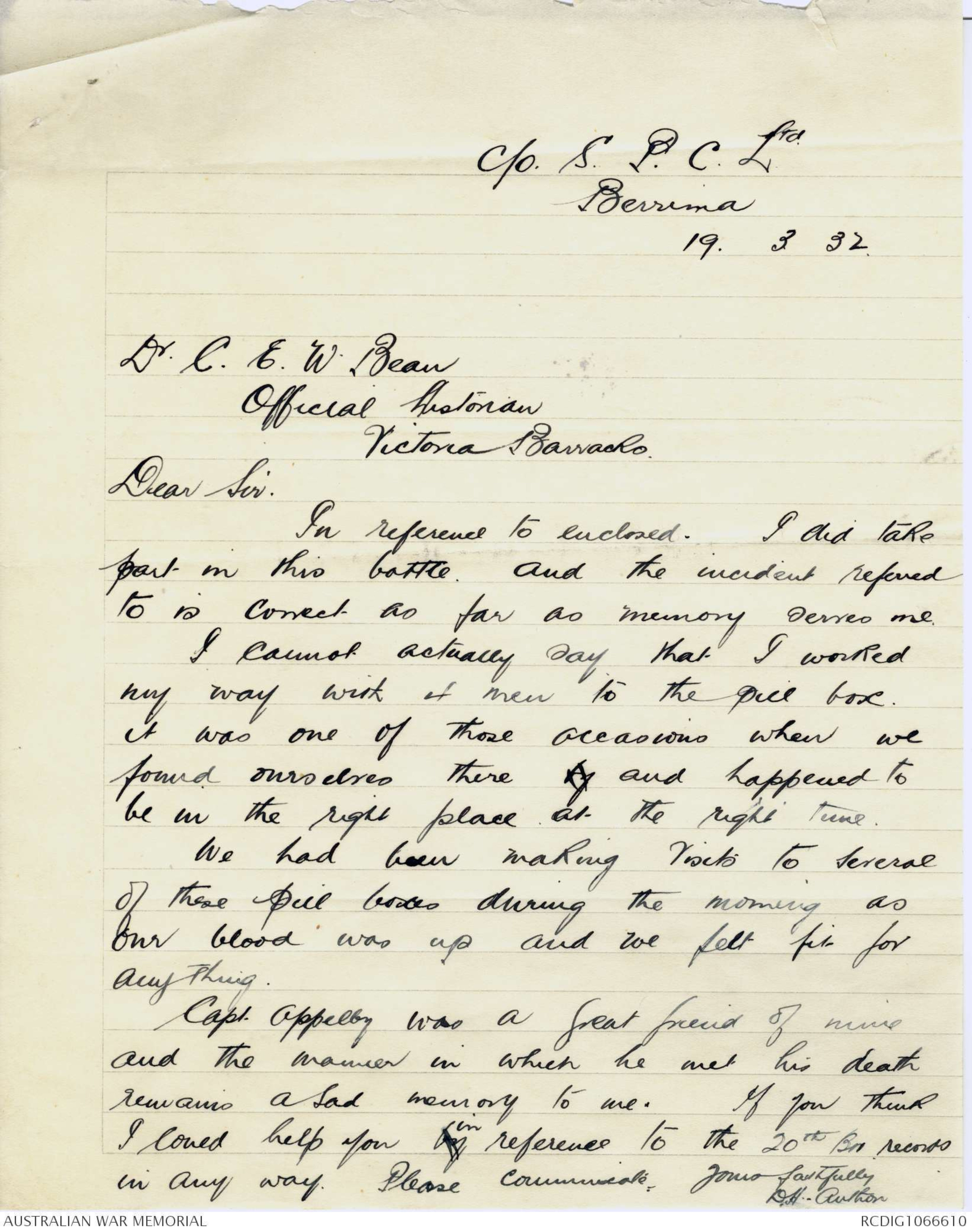
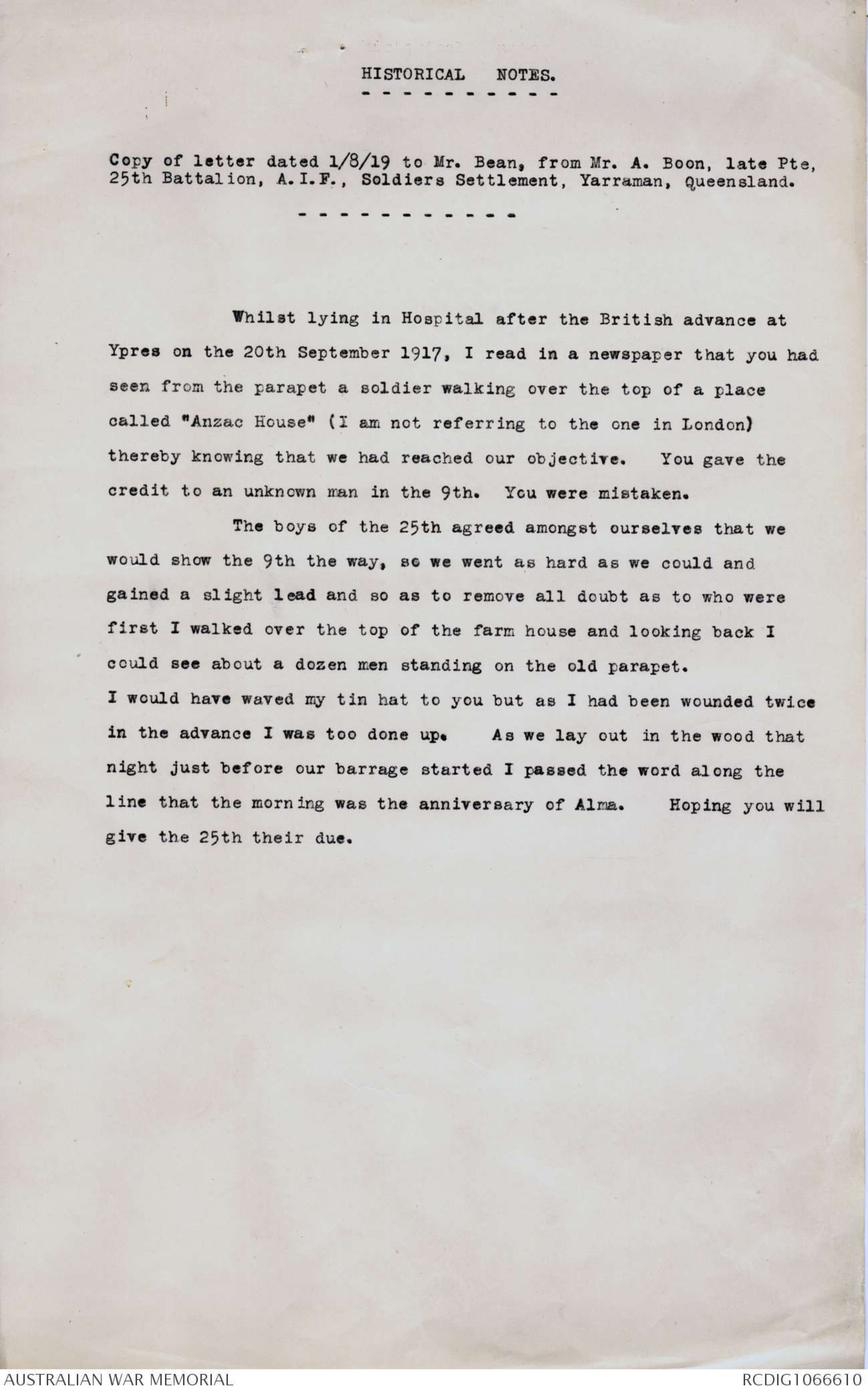
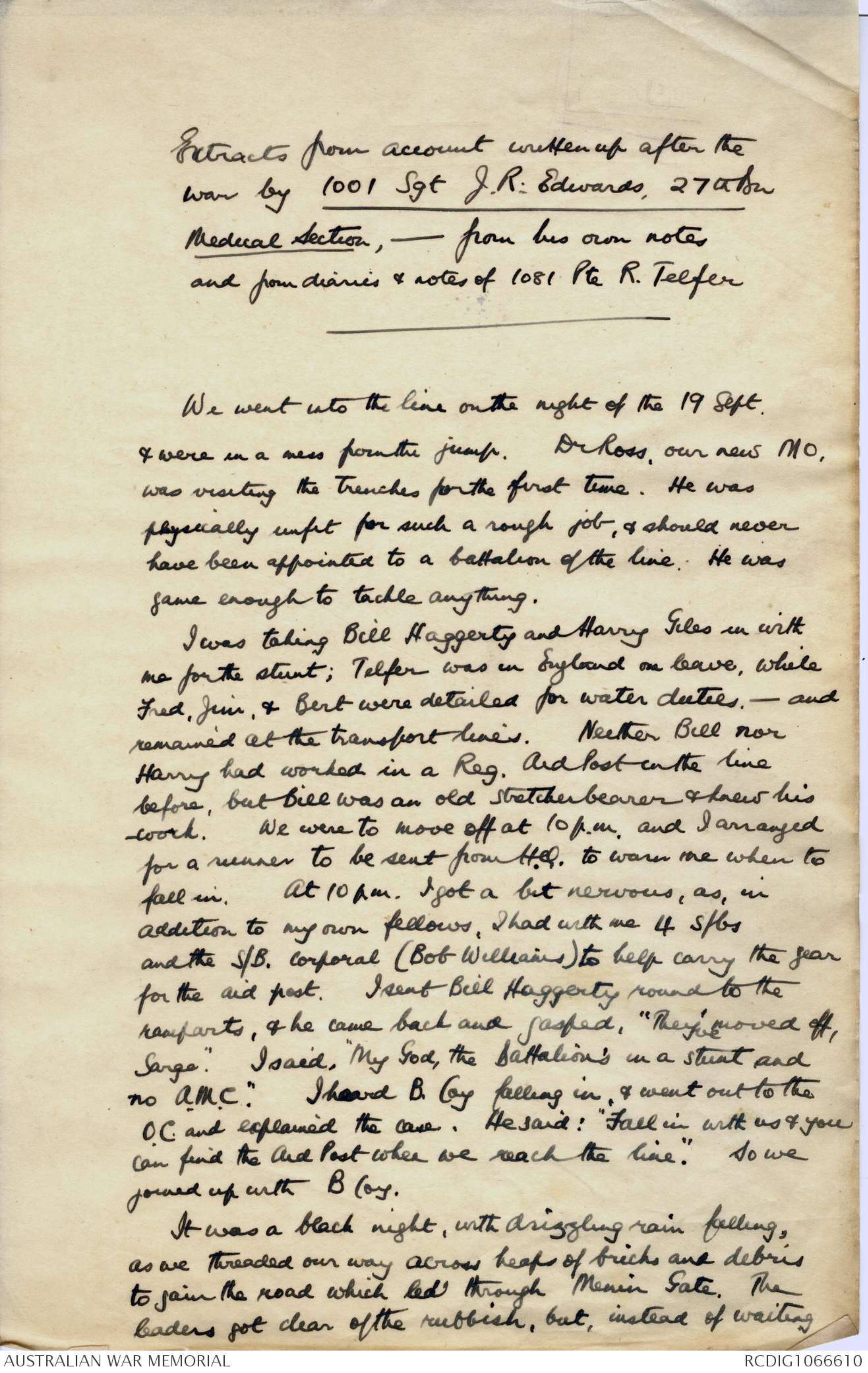
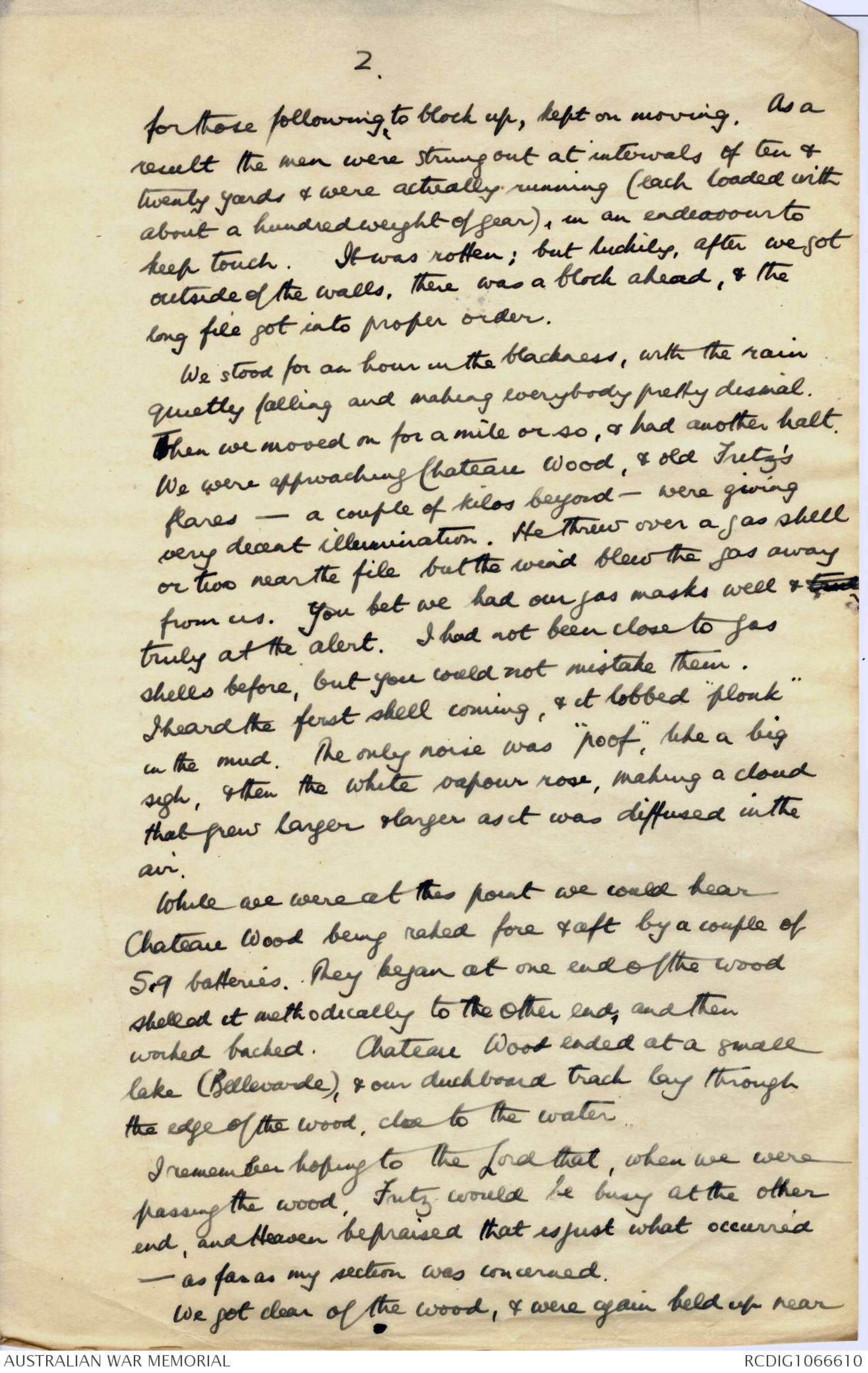
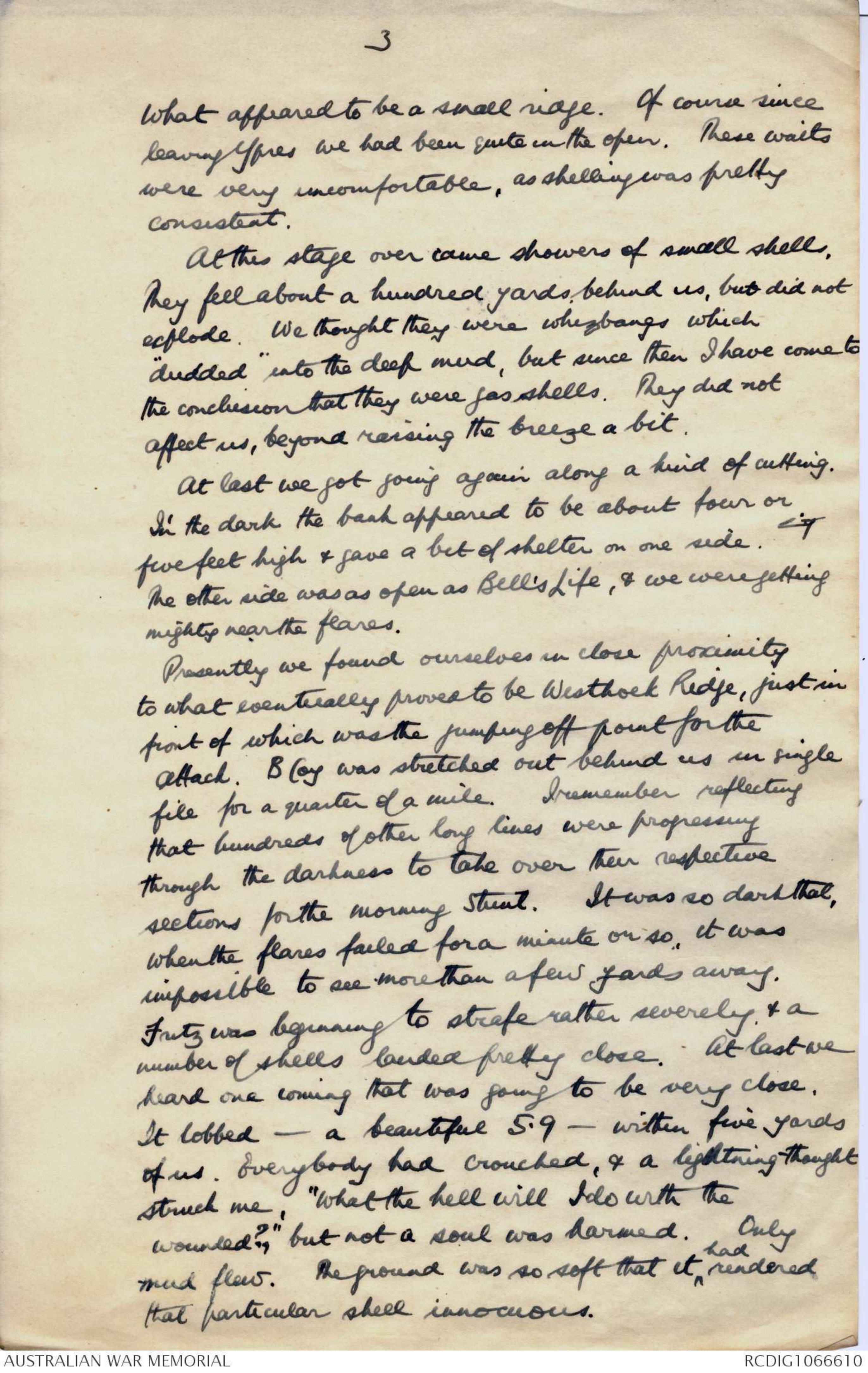
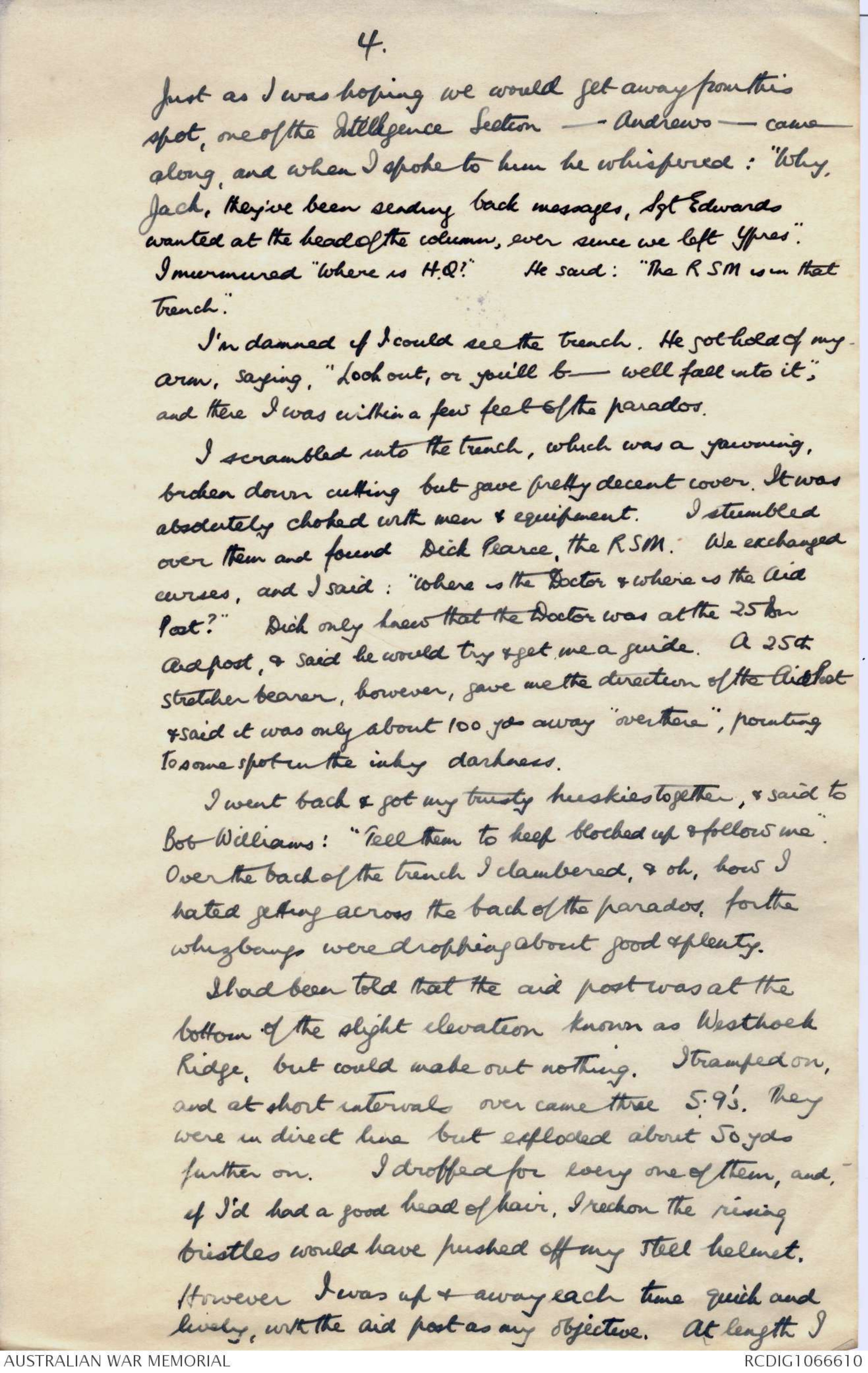
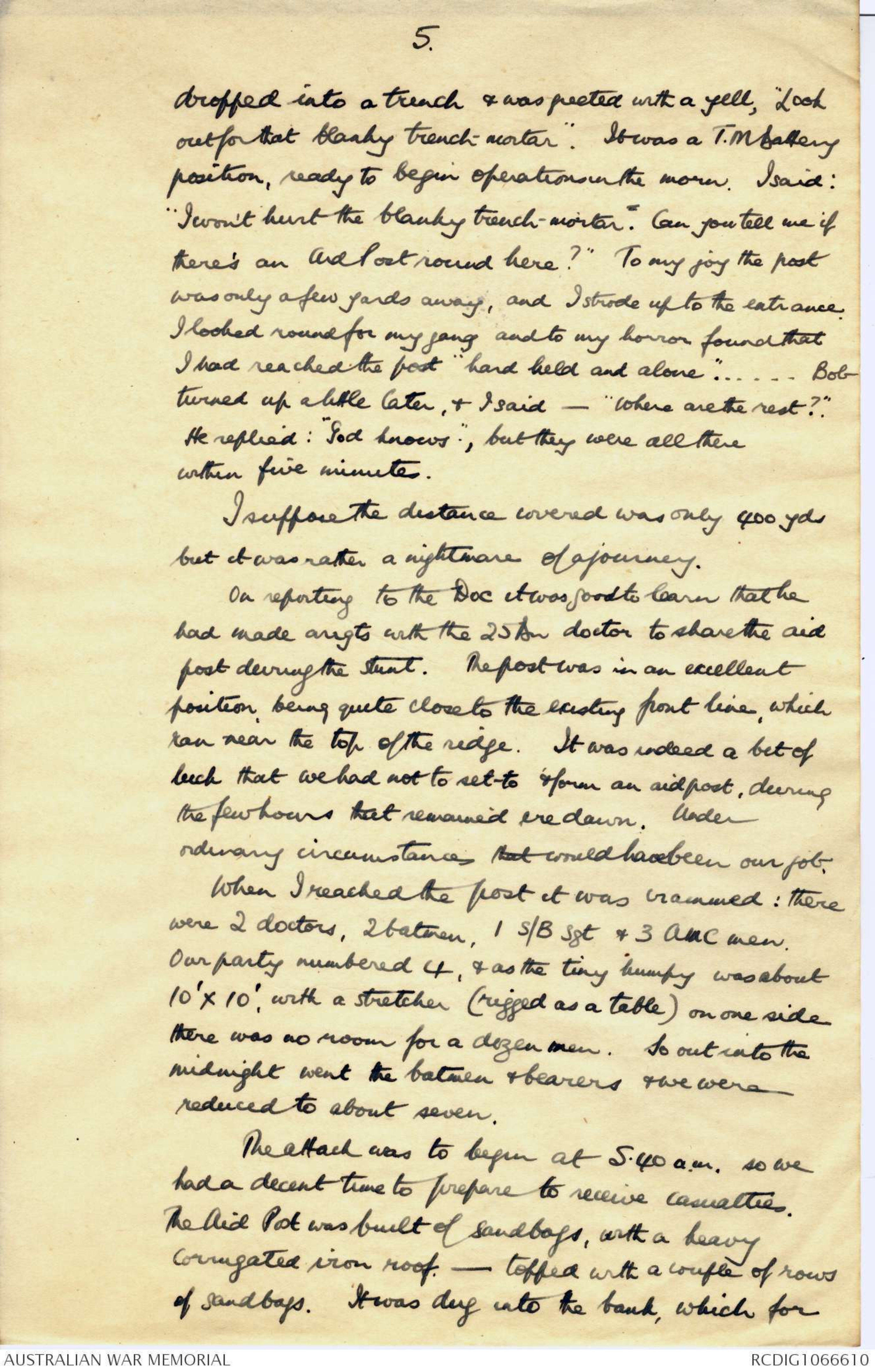
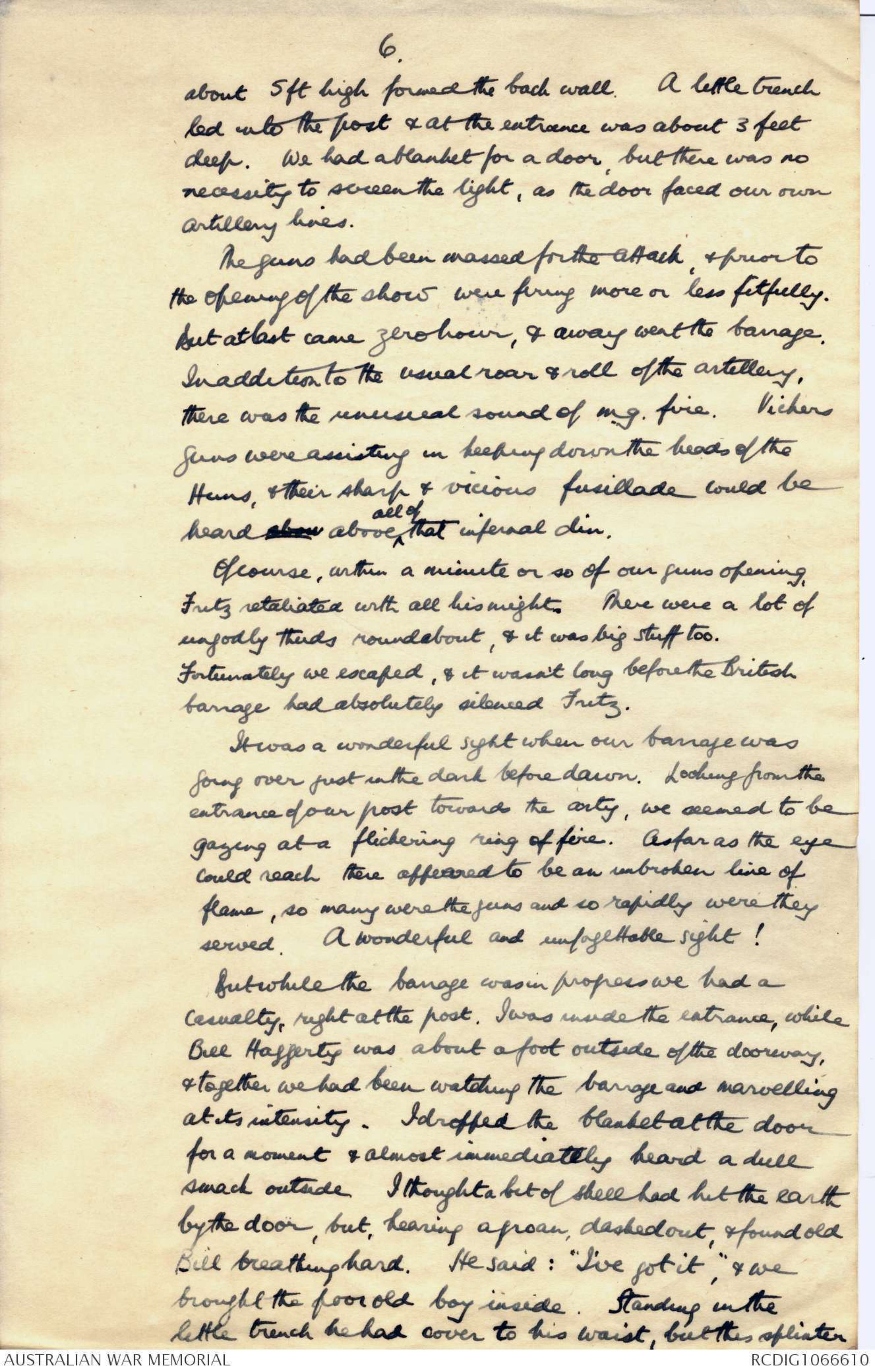
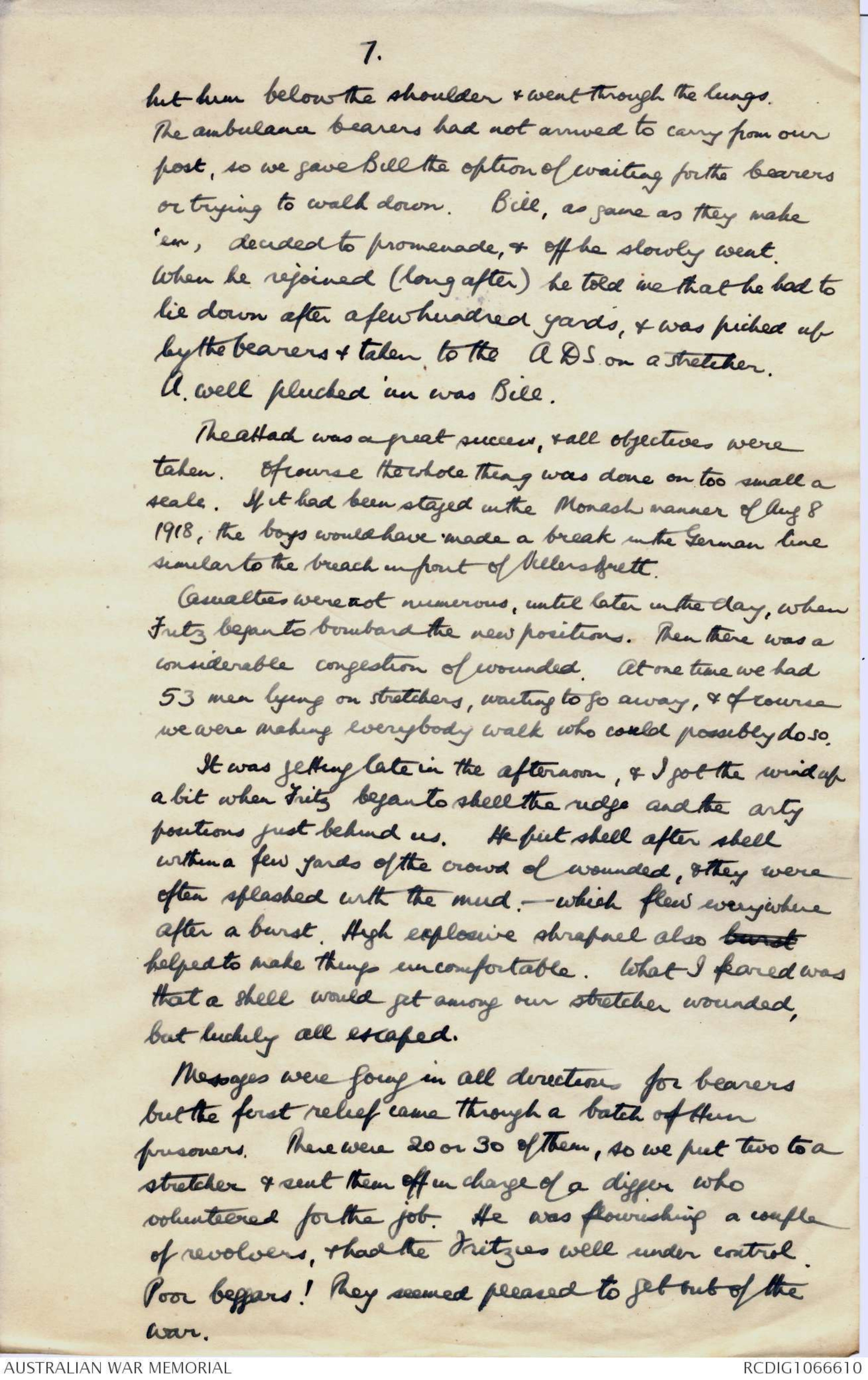
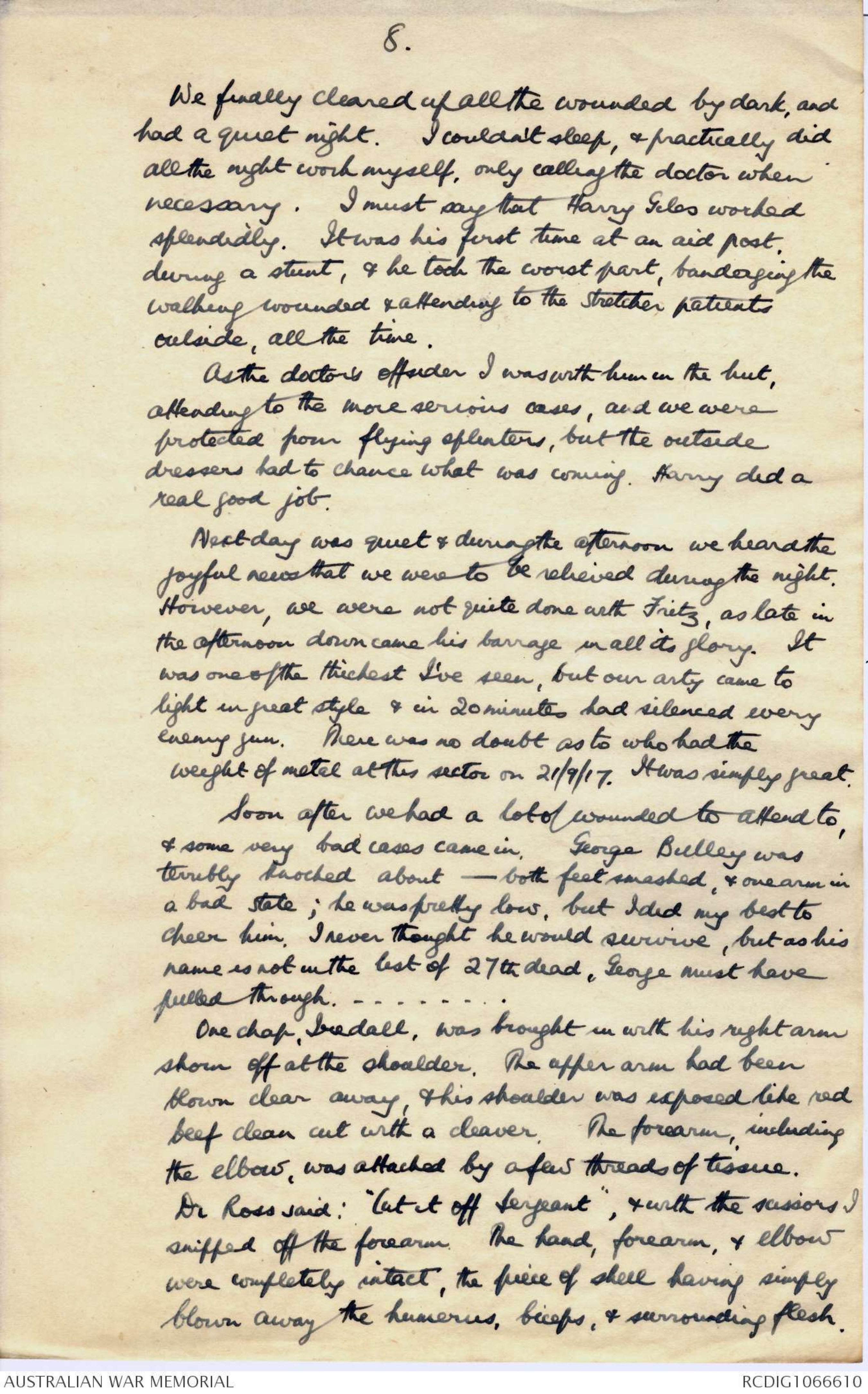
C/o. S.P.C. Ltd.
Berrima
19. 3 32.
Dr. C. E. W. Bean
Official Historian
Victoria Barracks.
Dear Sir.
In reference to enclosed. I did take
part in this battle. and the incident referred
to is correct as far as memory serves me.
I cannot actually say that I worked
my way with 4 men to the pill box.
It was one of those occasions when we
found ourselves there by and happened to
be in the right place at the right time.
We had been making visits to several
of these pill boxes during the morning as
our blood was up and we felt fit for
any thing.
Capt. Appelby was a great friend of mine
and the manner in which he met his death
remains a sad memory to me. If you think
I could help you by in references to the 20th Bn records
in any way. Please communicate.
Yours faithfully
D.H. Anthon
HISTORICAL NOTES.
Copy of letter dated 1/8/19 to Mr. Bean, from Mr. A. Boon, late Pte,
25th Battalion, A. I.F., Soldiers Settlement, Yarraman, Queensland.
Whilst lying in Hospital after the British advance at
Ypres on the 20th September 1917, I read in a newspaper that you had
seen from the parapet a soldier walking over the top of a place
called "Anzac House" (I am not referring to the one in London)
thereby knowing that we had reached our objective. You gave the
credit to an unknown man in the 9th. You were mistaken.
The boys of the 25th agreed amongst ourselves that we
would show the 9th the way, so we went as hard as we could and
gained a slight lead and so as to remove all doubt as to who were
first I walked over the top of the farm house and looking back I
could see about a dozen men standing on the old parapet.
I would have waved my tin hat to you but as I had been wounded twice
in the advance I was too done up. As we lay out in the wood that
night just before our barrage started I passed the word along the
line that the morning was the anniversary of Alma. Hoping you will
give the 25th their due.
Extracts from account written up after the
war by 1001 Sgt J. R. Edwards, 27th Bn
Medical Section, - from his own notes
and from diaries & notes of 1081. Pte R. Telfer
We went into the line on the night of the 19 Sept.
& were in a mess from the jump. Dr Ross, our new MO,
was visiting the trenches for the first time. He was
physically unfit for such a rough job, & should never
have been appointed to a battalion of the line. He was
game enough to tackle anything.
I was taking Bill Haggerty and Harry Giles in with
me for the stunt; Telfer was in England on leave, while
Fred, Jim, & Bert were detailed for water duties. - and
remained at the transport lines. Neither Bill nor
Harry had worked in a Reg. Aid Post in the line
before, but Bill was an old Stretcherbearer & knew his
work. We were to move off at 10 p.m. and I arranged
for a runner to be sent from H.Q. to warn me when to
fall in. At 10 pm. I got a bit nervous, as, in
addition to my own fellows, I had with me 4 S/bs
and the S/B. Corporal (Bob Williams) to help carry the gear
for the aid post. I sent Bill Haggerty round to the
ramparts, & he came back and gasped, "They've moved off,
Sarge." I said, "My God, the Battalion's in a stunt and
no A.M.C." I heard B Coy falling in, & went out to the
O.C. and explained the case. He said: "Fall in with us & you
can find the Aid Post when we reach the line." So we
joined up with B Coy.
It was a black night, with drizzling rain falling,
as we threaded our way across heaps of bricks and debris
to gain the road which led through Menin Gate. The
leaders got clear of the rubbish, but, instead of waiting
2.
for those following, to block up, kept on moving. As a
result the men were strung out at intervals of ten &
twenty yards & were actually running (each loaded with
about a hundred weight of gear), in an endeavour to
keep touch. It was rotten; but luckily, after we got
outside of the walls, there was a block ahead, & the
long file got into proper order.
We stood for an hour in the blackness, with the rain
quietly falling and making everybody pretty dismal.
Then we moved on for a mile or so, & had another halt.
We were approaching Chateau Wood, & old Fritz's
flares - a couple of kilos beyond - were giving
very decent illumination. He threw over a gas shell
or two near the file but the wind blew the gas away
from us. You bet we had our gas masks well & trtt
truly at the alert. I had not been close to gas
shells before, but you could not mistake them.
I heard the first shell coming, & it lobbed "plonk"
in the mud. The only noise was "poof," like a big
sigh, & then the white vapour rose, making a cloud
that grew larger & larger as it was diffused in the
air.
While we were at this point we could hear
Chateau Wood being raked fore & aft by a couple of
5.9 batteries. They began at one end of the wood
shelled it methodically to the other end, and then
worked backed. Chateau Wood ended at a small
lake (Bellevarde), & our duckboard track lay through
the edge of the wood, close to the water
I remember hoping to the Lord that, when we were
passing the wood, Fritz would be busy at the other
end, and Heaven be praised that is just what occurred
- as far as my section was concerned.
We got clear of the wood, & were again held up near
3
what appeared to be a small ridge. Of course since
leaving Ypres we had been quite in the open. These waits
were very uncomfortable, as shelling was pretty
consistent.
At this stage over came showers of small shells.
They fell about a hundred yards behind us, but did not
explode. We thought they were whizbangs which
"dudded" into the deep mud, but since then I have come to
the conclusion that they were gas shells. They did not
affect us, beyond raising the breeze a bit.
At last we got going again along a kind of cutting.
In the dark the bank appeared to be about four or
five feet high & gave a bit of shelter on one side. T
The other side was as open as Bell's Life, & we were getting
mighty near the flares.
Presently we found ourselves in close proximity
to what eventually proved to be Westhoek Ridge, just in
front of which was the jumping off point for the
attack. B Coy was stretched out behind us in single
file for a quarter of a mile. I remember reflecting
that hundreds of other long lines were progressing
through the darkness to take over their respective
sections for the morning stunt. It was so dark that,
when the flares failed for a minute on so, it was
impossible to see more than a few yards away.
Fritz was beginning to strafe rather severely, & a
number of shells landed pretty close. At last we
heard one coming that was going to be very close,
It lobbed - a beautiful 5.9 - within five yards
of us. Everybody had crouched, & a lightning thought
struck me, "what the hell will I do with the
wounded?", but not a soul was harmed. Only
mud flew. The ground was so soft that it ^had rendered
that particular shell innocuous.
4.
Just as I was hoping we would get away from this
spot, one of the Intelligence Section – Andrews - came -
along, and when I spoke to him he whispered: "Why,
Jack, they've been sending back messages, Sgt Edwards
wanted at the head of the column, ever since we left Ypres".
I murmured "Where is H.Q.?" He said: "The RSM is in that
Trench."
I'm damned if I could see the trench. He got hold of my
arm, saying, "Look out, or you'll b– well fall into it,"
and there I was within a few feet of the parados.
I scrambled into the trench, which was a yawning,
broken down cutting but gave pretty decent cover. It was
absolutely choked with men & equipment. I stumbled
over them and found Dick Pearce, the RSM. We exchanged
curses, and I said: "Where is the Doctor & where is the Aid
Post?" Dick only knew that the Doctor was at the 25 Bn
aid post, & said he would try & get me a guide. A 25th
stretcher bearer, however, gave me the direction of the Aid Post
& said it was only about 100 yds away "over there," pointing
to some spot in the inky darkness.
I went back & got my trusty huskies together, & said to
Bob Williams: "Tell them to keep blocked up & follow me."
Over the back of the trench I clambered, & oh, how I
hated getting across the back of the parados, for the
whizbangs were dropping about good & plenty.
I had been told that the aid post was at the
bottom of the slight elevation known as Westhoek
Ridge, but could make out nothing. I tramped on,
and at short intervals over came three 5.9's. They
were in direct line but exploded about 50 yds
further on. I dropped for every one of them, and,
if I'd had a good head of hair, I reckon the rising
bristles would have pushed off any steel helmet.
However I was up & away each time quick and
lively, with the aid post as my objective. At length I
5.
dropped into a trench & was greeted with a yell, "Look
out for that blanky trench mortar." It was a T.M Battery
position, ready to begin operations in the morn. I said:
"I won't hurt the blanky trench mortar." Can you tell me if
there's an Aid Post round here?" To my joy the post
was only a few yards away, and I strode up to the entrance.
I looked round for my gang and to my horror found that
I had reached the post "hard held and alone." . . . . . . Bob
turned up a little later, & I said – "Where are the rest?."
He replied: "God knows.", but they were all there
within five minutes.
I suppose the distance covered was only 400 yds
but it was rather a nightmare of a journey.
On reporting to the Doc it was good to learn that he
had made arrgts with the 25 Bn doctor to share the aid
post during the stunt. The post was in an excellent
position, being quite close to the existing post line, which
ran near the top of the ridge. It was indeed a bit of
luck that we had not to set-to & form an aid post, during
the few hours that remained predawn. Under
ordinary circumstances that would have been our job.
When I reached the post it was crammed: there
were 2 doctors, 2 batmen, 1 S/B Sgt & 3 AMC men.
Our party numbered 4, & as the tiny humpy was about
10'x10', with a stretcher (rigged as a table) on one side
there was no room for a dozen men. So out into the
midnight went the batmen & bearers & we were
reduced to about seven.
The attack was to begin at 5.40 a.m. so we
had a decent time to prepare to receive casualties.
The Aid Post was built of sandbags, with a heavy
corrugated iron roof. - topped with a couple of rows
of sandbags. It was dug into the bank, which for
6.
about 5ft high formed the back wall. A little trench
led into the post & at the entrance was about 3 feet
deep. We had a blanket for a door, but there was no
necessity to screen the light, as the door faced our own
artillery lines.
The guns had been massed for the attack, & prior to
the opening of the show were firing more or less fitfully.
but at last came zero hour, & away went the barrage.
In addition to the usual roar & roll of the artillery,
there was the unusual sound of mg. fire. Vickers
guns were assisting in keeping down the heads of the
Huns, & their sharp & vicious fusillade could be
heard bou above ^all of that infernal din.
Of course, within a minute or so of our guns opening,
Fritz retaliated with all his might. There were a lot of
ungodly thuds roundabout, & it was big stuff too.
Fortunately we escaped, & it wasn't long before the British
barrage had absolutely silenced Fritz.
It was a wonderful sight when our barrage was
going over just in the dark before dawn. Looking from the
entrance of our post toward the arty, we seemed to be
gazing at a flickering ring of fire. As far as the eye
could reach there appeared to be an unbroken line of
flame, so many were the guns and so rapidly were they
served. A wonderful and unforgettable sight!
But while the barrage was in progress we had a
casualty, right at the post. I was inside the entrance, while
Bill Haggerty was about a foot outside of the doorway,
& together we had been watching the barrage and marvelling
at its intensity. I dropped the blanket at the door
for a moment & almost immediately heard a dull
smack outside I thought a bit of shell had hit the earth
by the door, but, hearing a groan, dashed out, & found old
Bill breathing hard. He said: "Ive got it," & we
brought the poor old boy inside. Standing in the
little trench he had cover to his waist, but this splinter
7.
hit him below the shoulder & went through the lungs.
The ambulance bearers had not arrived to carry from our
post, so we gave Bill the option of waiting for the bearers
or trying to walk down. Bill, as game as they make
'em, decided to promenade, & off he slowly went.
When he rejoined (long after) he told me that he had to
lie down after a few hundred yards, & was picked up
by the bearers & taken to the A.D.S. on a stretcher.
A. well plucked 'un was Bill.
The attack was a great success, & all objectives were
taken. Of course the whole thing was done on too small a
scale. If it had been staged in the Monash manner of Aug 8
1918, the boys would have made a break in the German line
similar to the breach in front of Villersbrett.
Casualties were not numerous, until later in the day, when
Fritz began to bombard the new positions. Then there was a
considerable congestion of wounded. At one time we had
53 men lying on stretchers, waiting to go away, & of course
we were making everybody walk who could possibly do so.
It was getting late in the afternoon, & I got the wind up
a bit when Fritz began to shell the ridge and the arty
positions just behind us. He put shell after shell
within a few yards of the crowd of wounded, & they were
often splashed with the mud. - which flew everywhere
after a burst. High explosive shrapnel also bust
helped to make things uncomfortable. What I feared was
that a shell would get among our stretcher wounded,
but luckily all escaped.
Messages were going in all directions for bearers
but the first relief came through a batch of Hun
prisoners. There were 20 or 30 of them, so we put two to a
stretcher & sent them off in charge of a digger who
volunteered for the job. He was flourishing a couple
of revolvers, & had the Fritzies well under control.
Poor beggars! They seemed pleased to get out of the
war.
8.
We finally cleared up all the wounded by dark, and
had a quiet night. I couldn't sleep, & practically did
all the night work myself, only calling the doctor when
necessary. I must say that Harry Giles worked
splendidly. It was his first time at an aid post,
during a stunt, & he took the worst part, bandaging the
walking wounded & attending to the stretcher patients
outside, all the time.
As the doctor's offsider I was with him in the hut,
attending to the more serious cases, and we were
protected from flying splinters, but the outside
dressers had to chance what was coming. Harry did a
real good job.
Next day was quiet & during the afternoon we heard the
joyful news that we were to be relieved during the night.
However, we were not quite done with Fritz, as late in
the afternoon down came his barrage in all its glory. It
was one of the thickest I've seen, but our arty came to
light in great style & in 20 minutes had silenced every
enemy gun. There was no doubt as to who had the
weight of metal at this sector on 21/9/17. It was simply great.
Soon after we had a lot of wounded to attend to,
& some very bad cases came in. George Bulley was
terribly knocked about - both feet smashed, & one arm in
a bad state; he was pretty low, but I did my best to
cheer him. I never thought he would survive, but as his
name is not in the list of 27th dead, George must have
pulled through. . . . . .
One chap, Iredall, was brought in with his right arm
shorn off at the shoulder. The upper arm had been
blown clear away, & his shoulder was exposed like red
beef clean cut with a cleaver. The forearm, including
the elbow, was attached by a few threads of tissue.
Dr Ross said: "Cut it off Sergeant", & with the scissors I
snipped off the forearm. The hand, forearm, & elbow
were completely intact, the piece of shell having simply
blown away the humerus, biceps, & surrounding flesh.
 Maralyn K
Maralyn KThis transcription item is now locked to you for editing. To release the lock either Save your changes or Cancel.
This lock will be automatically released after 60 minutes of inactivity.